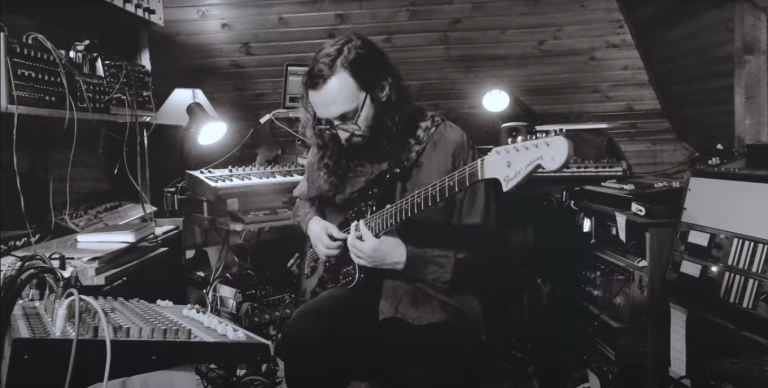
Eblis Álvarez, the Mind Behind Meridian Brothers on New Album, Mi Latinoamérica Sufre
14 August, 2024In the ever-evolving landscape of Latin American music, few artists manage to navigate the complex interplay between tradition and innovation as deftly as Eblis Álvarez, the creative force behind Meridian Brothers. Known for his eclectic approach and fearless experimentation, Álvarez has been instrumental in shaping the sound of contemporary Colombian and Latin-American music, pushing boundaries while staying rooted in cultural authenticity.
In this exclusive interview, we explore the creative mind of Álvarez as he discusses the inspiration behind Meridian Brothers’ latest album, Mi Latinoamérica Sufre. Álvarez, with his trademark sharp insight, shares how Bogotá’s dynamic music scene has influenced his work, the role of collaboration in his artistic journey, and the significance of his other projects in shaping his approach to music.
Tell us briefly about Mi Latinoamérica Sufre. As usual, the album carries a ton of richness, both sonically and in the underlying social commentary. What are some of the elements you were looking to portray in the record, and how does it fit into MB’s vast discography?
Mi Latinoamérica Sufre is essentially an album devoted to the guitar. The main mould is inspired by Juju, highlife, and souk contemporary formats, where two guitars interact—one taking the lead, the other providing the foundation, supporting the ‘chanting’ guitar.
I’ve tried to recreate a similar sound in different contexts. One part is purely fantastical, something that doesn’t necessarily have a direct reference, abstract, contrapuntal, and eccentric. The other part is more concrete, drawing from styles prevalent in contemporary Colombia, such as cumbia or huayno, and even funk.
Meridian Brothers has always been synonymous with innovation, blending traditional Latin sounds with avant-garde experimentation. How do you navigate the thin line between honoring your musical roots and pushing sonic boundaries?
Well, that could be an external description of how Meridian Brothers is regarded. I don’t adhere to certain movements or attitudes towards art—like being avant-garde or something else. Mostly, I try to develop a kind of music that is uniform and organized around a central idea.
This central idea is fed by cultural components, some from Latin American folk music, but also archetypes, references, and, of course, inspiration. So the navigation is done mostly by these different orders I establish before making a record.
Your music reflects the richness of Bogotá’s vibrant scene and eclectic sounds. How has the city’s evolving music scene influenced your creative process, and specifically the thematic direction of Meridian Brothers?
Yeah, definitely, Bogotá plays an important role in my creation. I guess this is what I call the “unconscious collective,” a way for the minds of a certain community to connect and evolve together. I personally think that this is a property of human societies, and of course, Bogotá has this “unconscious collective” in music.
It’s a total flow of information, coming and going from individual to individual, feeding the collective towards a direction—towards an expression.
With your involvement in other projects such as Los Pirañas, Chúpame el Dedo, and others, collaboration seems to be a cornerstone of your work. Can you delve into how these collaborative experiences have shaped your approach to music with Meridian Brothers? Any recent contributions you would like to highlight?
Yeah, Los Pirañas and Chúpame el Dedo have been a source of more things to say. Each project has its own “vibe”, which can be different from the Meridian Brothers but helps me diversify and filter my main creative energy.
Also, working with Pedro Ojeda and Mario Galeano really makes me better at the way I make music. These two guys are really big musical minds.
Studios such as Isaac Newton and others have been crucial spaces for your sonic experiments. How does the environment of your studio inspire and facilitate the creative process for Meridian Brothers? Can you share any particularly memorable moments from your recent times there?
Yeah! Many memorable moments and a lot of music made there. The last one was when I recorded the video for “Mandala,” where I had to simulate the way I recorded the song. It was very funny and a total challenge!
Your live performances are usually a wonder to watch and experience. What has remained or changed about the band’s live performances during this phase and tour?
I think the band is in a very mature state now. Mange, Cesar, Mauricio, Alejandro, and also our sound engineer, Alejandro Araujo, are really connected to the music, and they are very skilled musicians in a deeply synchronized mood.
We made the complete arrangements for “Mandala” and “En el Caribe estoy triste” from the new album in barely 10 days, with astonishing sound. So, actually, we are sharper in getting the message of each song across and putting it in a deeper way than on the albums.
Amazing. I really hope the world tour comes along very well, and thank you so much for this chat.
Thank you!
Meridian Brothers will be touring Europe and North America, in support of their latest album Mi Latinoamérica Sufre. Click here for more info about dates and tickets.
Follow Sounds and Colours: Facebook / Twitter / Instagram / Mixcloud / Soundcloud / Bandcamp
Subscribe to the Sounds and Colours Newsletter for regular updates, news and competitions bringing the best of Latin American culture direct to your Inbox.

